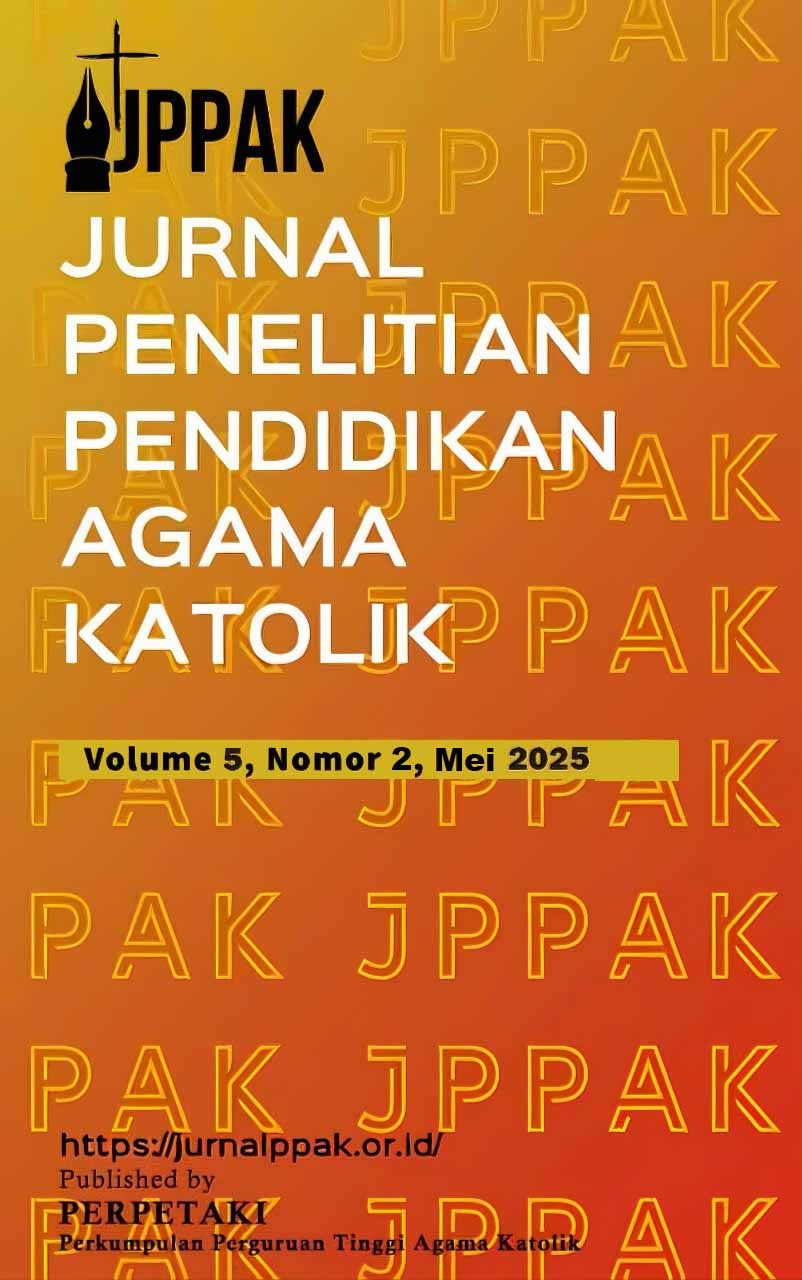Pembentukan Karakter Siswa Ditinjau dari Spiritualitas Perkumpulan Dharmaputri dan Dukungan Orang Tua
DOI:
https://doi.org/10.52110/jppak.v5i2.233Keywords:
Dukungan Orang Tua, Karakter, SpiritualitasAbstract
Education within the Catholic Church has always had its distinct characteristics. The unique characteristics of Catholic schools are implemented at SMAK Santa Maria Malang. In addition to the school, parents also play a role in shaping the character of students. However, not all students at SMAK Santa Maria Malang exhibit good character, especially in terms of respect and responsibility. This study aims to determine the influence of Dharmaputri spirituality and parental support on the character formation of students at SMAK Santa Maria Malang. To achieve the research objectives, multiple linear regression analysis was used with the help of SPSS for Windows 26. The population in this study consisted of 403 students, with a sample size of 200 students. The sampling technique employed was random sampling. The findings revealed a correlation coefficient (R) of 0.905, indicating a positive correlation between the two variables with a very strong relationship. Furthermore, the Dharmaputri Spirituality variable obtained a t-value (0.000<0.05), and the Parental Support variable also obtained a t-value (0.000<0.05), meaning that both variables independently have a significant influence on character formation. Based on the SPSS output table, the significant F-value was obtained (0.000<0.05), indicating that there is an influence between Dharmaputri Spirituality and Parental Support on Character Formation simultaneously. Thus, Dharmaputri spirituality and parental support together have an impact on the character formation variable.
Downloads
##submission.downloads##
Submitted
Accepted
Published
How to Cite
Issue
Section
License
Copyright (c) 2025 Monica Innanda Chiaralazzo, Paskalis Edwin I Nyoman Paska, Laurensius Laka

This work is licensed under a Creative Commons Attribution-ShareAlike 4.0 International License.
Copyright Notice and Permissions
Jurnal Penelitian Pendidikan Agama Katolik offers immediate open access to all its content on the principle to make researches freely available to the public, especially to the scholars, to support greater global exchanges of knowledge. This journal encourages all scholarly authors to allow their research openly available, free access and without time restrictions.
All articles published Open Access will be immediately and permanently free for everyone to read and download. Under the CC BY-SA 4.0 license, authors retain ownership of the copyright for their article, however authors grant others permission to use the content of publications in Jurnal Penelitian Pendidikan Agama Katolik (JPPAK) in whole or in part provided that the original work is properly cited. Users (redistributors) of Jurnal Penelitian Pendidikan Agama Katolik (JPPAK) are required to cite the original source by including at least: the full title of the article, the author's or authors' full name(s), JPPAK as the initial source of publication, year of publication and volume number using a propriate citing method.
Copyright encompasses exclusive rights to reproduce and deliver the article in all form and media, including reprints, photographs, microfilms and any other similar reproductions, as well as translations. The reproduction of any part of this journal, its storage in databases and its transmission by any form or media, such as electronic, electrostatic and mechanical copies, photocopies, recordings, magnetic media is prohibited without consent of Jurnal Penelitian Pendidikan Agama Katolik (JPPAK).
Jurnal Penelitian Pendidikan Agama Katolik (JPPAK) is licensed under a Creative Commons Attribution Share-Alike 4.0 International. (CC BY-SA 4.0)
Authors who publish with Jurnal Penelitian Pendidikan Agama Katolik (JPPAK) agree to the following terms:
- Authors retain copyright and grant the journal right of first publication with the work simultaneously licensed under a Creative Commons Attribution Share-Alike 4.0 International (CC BY-SA 4.0) license that allows others to share the work with an acknowledgement of the work's authorship and initial publication in this journal.
- Authors are able to enter into separate, additional contractual arrangements for the non-exclusive distribution of the journal's published version of the work (e.g., post it to an institutional repository or publish it in a book), with an acknowledgement of its initial publication in this journal.
- Authors are permitted and encouraged to post their work online (e.g., in institutional repositories or on their website) after the publication on JPPAK, as long as it not published on other OJS for it will be treated as plagiarism by plagiarism checker apps. It can lead to productive exchanges, as well as earlier and greater citation of published work (See The Effect of Open Access).












